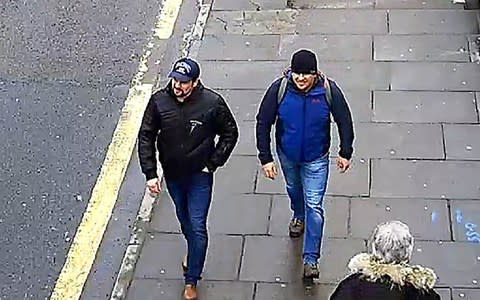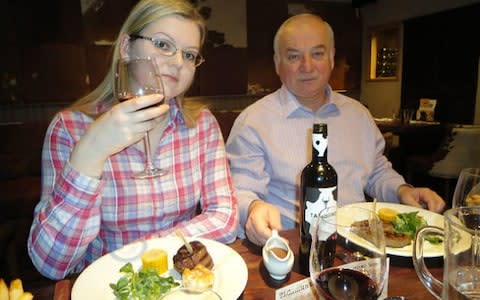Real identity of third Skripal suspect revealed

The real name of the third Russian agent involved in the Salisbury nerve agent attack has been revealed as Denis Vyacheslavovich Sergeyev by an open-source investigation.
The Daily Telegraph first reported in September that British investigators believed that a third GRU military intelligence officer had travelled to the UK to reconnoiter Salisbury before the hit on former Russian agent Sergei Skripal.
It later emerged that the man had come to Britain under the alias Sergei Fedotov, arriving the same day as Anatoly Chepiga and Alexander Mishkin, the agents who smeared the Novichok nerve agent on Mr Skripal's door handle in March.
Now investigative group Bellingcat along with the Russian site The Insider and the Czech outlet Respekt have claimed that Fedotov was in fact Denis Sergeyev, born on September 17, 1973 in a military town in what is now Kazakhstan.
They found that he served in the army in southern Russia before studying at the military diplomatic academy in Moscow, the “GRU conservatory” that trains 100 officers for the GRU each year.
The Telegraph has uncovered additional information confirming Sergeyev's GRU ties and showing that he was groomed for a military career from childhood.
It also found that the Russian authorities appear to have already made some attempts to scrub Sergeyev's name from publicly available information.
A Moscow database showed that Sergeyev was registered at the address of the GRU conservatory.
A woman with the same surname who was born in 1971, possibly Sergeyev's wife, registered a Lada car to the military base at the same address. The Bellingcat investigation said Sergeyev was married with an adult daughter.
Sergeyev studied at the Suvorov military academy in Yekaterinburg, which was founded in the Second World War and prepares boys for military service starting in the fifth class, The Telegraph found. In 1990, the year that Sergeyev graduated, it was named the best of all Suvorov academies in the Soviet Union.
Sergeyev would have studied foreign languages from a young age: The academy's site says a unique aspect of its curriculum is that every student takes English and German along with an optional third language. The school also focuses on sport and a “military patriotic upbringing”.
Although Sergeyev's name and birth date can be seen in the archived preview of a list of academy graduates in online search results, the link leads to a blank space on the school's site, suggesting the list has recently been taken down.

Bellingcat has said it will publish a report next week about the efforts to purge the names of the three Salisbury suspects from public records.
Twelve of the Yekaterinburg academy's graduates have been declared heroes of the Soviet Union or Russian Federation, the country's top honour, which was also awarded to Skripal poisoning suspects Anatoly Chepiga and Alexander Mishkin.
Neither the academy nor classmates of Sergeyev could be reached for comment on Thursday evening.
In 2010, Sergeyev received his fake “Fedotov” passport at the same Moscow desk that gave Chepiga and Mishkin their cover identity documents, Thursday's investigation said.
The spy was previously known to have travelled extensively in Europe under the guise of Fedotov, and possibly even stayed in the UK after the attempt to poison Mr Skripal: He checked himself and his baggage off the flight back to Russia with Chepiga and Mishkin.
He frequently skipped return flights and made his way home through circuitous alternative routes in an apparent attempt to escape detection.
The Bellingcat investigation found that Sergeyev visited Barcelona undercover during the 2017 independence referendum. He came to London at least five times, including in the lead-up to the Brexit referendum.
His visit to Bulgaria on April 28, 2015, coincided with the suspected poisoning of a Bulgarian businessman who had sold arms to Ukraine. That country has been fighting Russia-backed separatists since 2014.
British investigators are currently in Bulgaria to examine whether that incident was related to Skripal's poisoning.
The Bulgarian businessmen believes lab tests suggest he was poisoned with an agent similar to Novichok.
A man with the same full name as Sergeyev registered a Volkswagen Passat in 2010, the same year the GRU agent entered undercover service, according to insurance records.
Vladimir Putin has dismissed suggestions Russia was behind the attempt on Mr Skripal's life despite growing evidence to the contrary.

He and his daughter Yulia fell gravely ill but are recovering. Dawn Sturgess, a woman from a town near Salisbury, died after finding a discarded perfume bottle that held the Novichok.
At Mr Putin's suggestion, the two men later revealed to be Chepiga and Mishkin gave a ludicrous interview to Russian state television claiming they were nutritional supplement salesmen who had gone to Salisbury repeatedly to see the famous cathedral.
The Netherlands deported four GRU agents last year for attempted to hack the network of the headquarters of the organisation responsible for testing the Novichok used in Salisbury and other chemical weapons.
The GRU has previously been linked to high-profile operations abroad including the US election hacking and the annexation of Crimea.
Despite its fearsome reputation, its employees have often been careless in their work. More than 300 suspected agents registered automobiles to the address of a GRU base, it was discovered last year.

 Yahoo News
Yahoo News 
